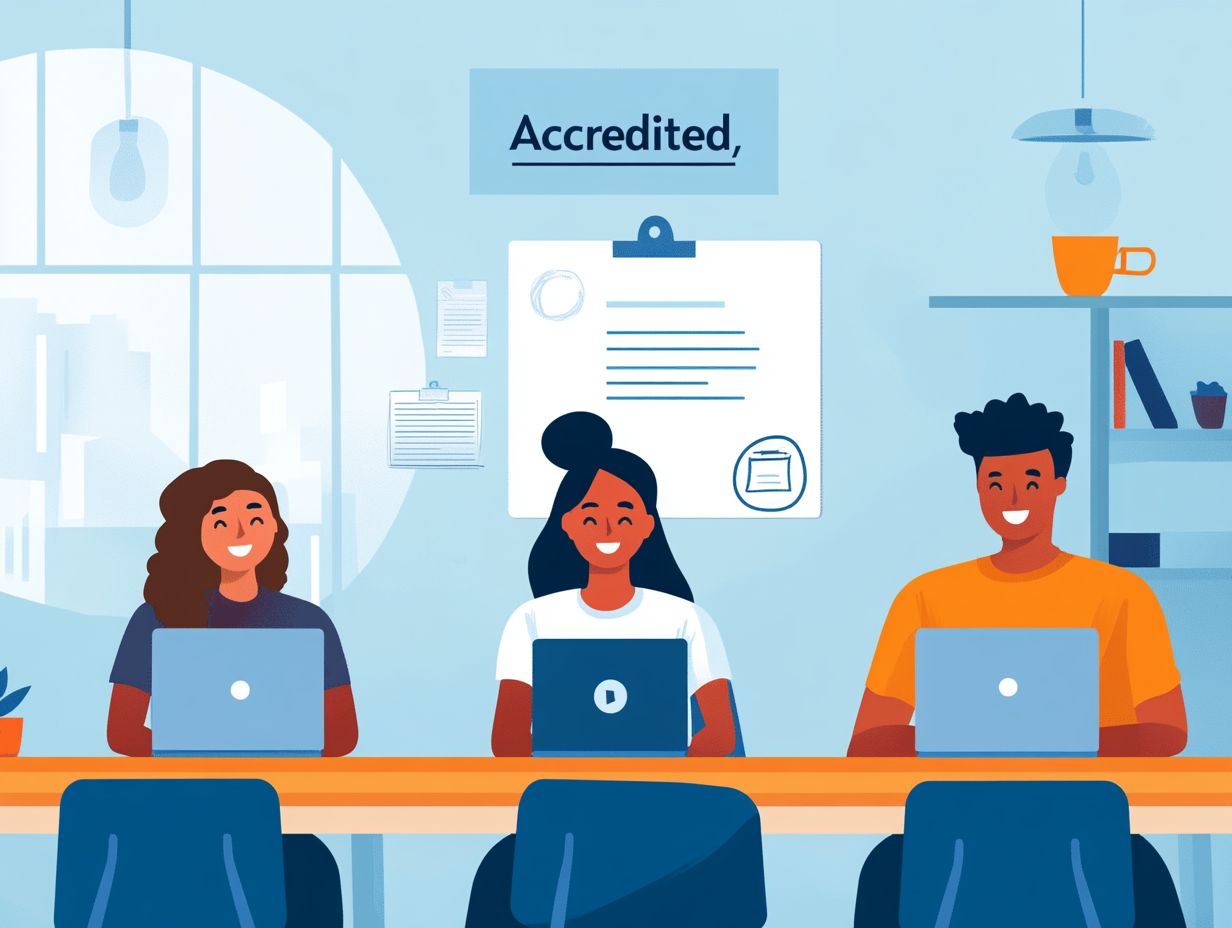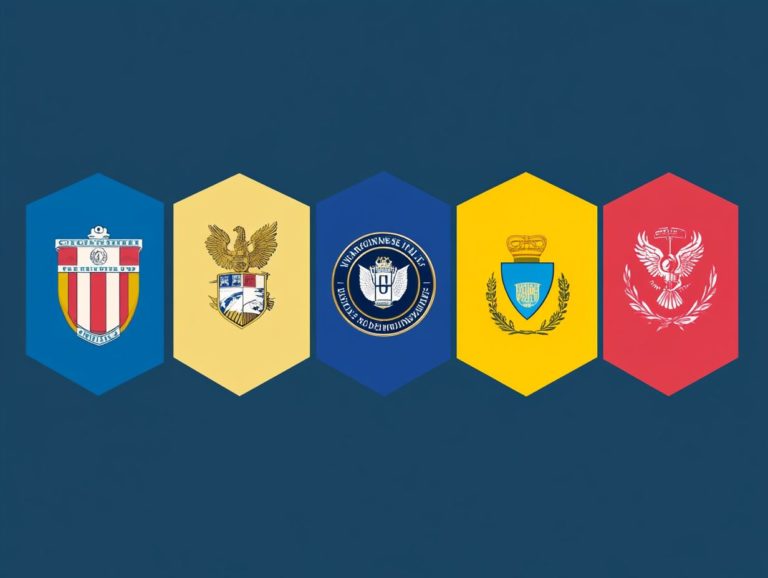The Role of Accreditation in Online Learning
Accreditation is crucial in the realm of online learning. It serves as a guarantee that educational programs adhere to established quality standards.
In this piece, you’ll uncover what accreditation truly entails and its vital purpose. We’ll emphasize the benefits it provides to students, such as assurance of quality and the ability to transfer credits seamlessly.
You will also delve into the accreditation process, get acquainted with recognized accrediting agencies organizations that assess educational quality and explore the challenges and controversies that currently surround accreditation.
Finally, we will offer a forward-looking perspective on emerging trends poised to influence the future of accreditation in online education.
Contents
- Key Takeaways:
- Why Accreditation Matters for Online Learning
- Benefits of Accreditation for Students
- The Accreditation Process for Online Programs
- Accreditation Agencies for Online Learning
- Challenges and Controversies Surrounding Accreditation
- The Future of Accreditation in Online Learning
- Frequently Asked Questions
- What is the role of accreditation in online learning?
- Why is accreditation important in online learning?
- Who grants accreditation to online learning programs?
- How does the accreditation process work for online learning programs?
- Are all online learning programs accredited?
- What happens if an online learning program is not accredited?
Key Takeaways:

Accreditation ensures quality and the transferability of credits for students in online learning. Understanding what to look for in an accredited online program is crucial, as accreditation agencies set criteria and standards to maintain the effectiveness of online programs. The future of accreditation in online learning is evolving, with potential changes and emerging trends being closely monitored and debated.
Why Accreditation Matters for Online Learning
Understanding why accreditation matters for online degrees is essential for students, educational institutions, and stakeholders in higher education. It acts as a quality assurance mechanism, ensuring that accredited online colleges meet established standards.
The accreditation process thoroughly checks important areas of these institutions, including academic programs, student services, and overall effectiveness. This is especially crucial for first-generation students navigating financial aid and educational opportunities in distance education.
By guaranteeing that programs conform to quality standards, accreditation promotes academic integrity and enhances learning outcomes for online learners.
Definition and Purpose of Accreditation
Accreditation is the formal recognition of an educational institution or program s quality and effectiveness. It ensures that it meets specific educational standards established by recognized accreditation agencies.
This process is essential because it assures students and employers that the education received is rigorous and relevant. Accreditation acts as a benchmark for academic integrity, evaluating curricula, faculty qualifications, student support services, and overall institutional performance.
For those considering online colleges and programs, which have gained significant traction, accreditation becomes even more critical. It guarantees that degrees earned remotely carry the same value and recognition as those from traditional learning environments.
This assurance gives you the power to pursue your academic goals with confidence, knowing that your investment in education is worthwhile.
Benefits of Accreditation for Students
Accreditation provides numerous advantages for students pursuing education through accredited online colleges. It guarantees a quality education recognized and respected by employers and other educational institutions.
This recognition enhances your credentials and opens doors to future opportunities, setting you on a path to success.
Quality Assurance and Transferability of Credits
Quality assurance through accreditation ensures that your online degree program meets rigorous educational standards. This enables you to transfer credits seamlessly between accredited institutions.
This guarantee of quality enhances program credibility and gives you peace of mind, knowing you are receiving an education that is respected in the academic world.
For anyone pursuing higher education, accreditation acts as a crucial framework, allowing you to navigate your academic journey with confidence.
You can trust that your hard-earned credits are more likely to be accepted whenever you decide to transfer. This flexibility significantly boosts your educational mobility, giving you the power to explore diverse opportunities without the worry of losing valuable coursework you’ve already completed.
Ultimately, this contributes to improved institutional effectiveness and greater satisfaction for students like you.
Let s explore how accreditation can empower your educational journey! Embrace the power of accreditation and take the first step towards a confident educational future!
The Accreditation Process for Online Programs

The accreditation process for online programs involves a thorough evaluation against strict criteria set by respected accreditation agencies.
This process ensures that institutions are committed to providing quality education.
Criteria and Standards for Accreditation
Accreditation criteria are set by recognized agencies that evaluate the academic integrity and effectiveness of educational programs.
These criteria often include clear goals for what students should learn, allowing institutions to assess both student performance and program effectiveness objectively.
By focusing on metrics like graduation rates and student engagement, agencies help ensure that programs meet regulatory expectations while fostering an environment where students can thrive.
This evaluation process is vital for quality assurance, guaranteeing robust and relevant online learning experiences aligned with academic standards.
Ultimately, these measures enhance the effectiveness of online learning, nurturing a culture of continuous improvement and accountability within institutions.
Accreditation Agencies for Online Learning
Accreditation agencies play a key role in maintaining the standards and quality of online learning institutions, making it crucial to understand accreditation for online degrees.
Many recognized organizations oversee the accreditation process in distance education, ensuring you receive a reputable and valuable educational experience.
Recognized Agencies and Their Requirements
Accreditation agencies establish specific requirements for institutions seeking accreditation, emphasizing quality assurance and adherence to educational standards in distance education.
These requirements typically include thorough evaluation processes that review curriculum quality, faculty qualifications, and available resources.
Institutions must demonstrate effective student support services and a commitment to continuous improvement, ensuring you receive the guidance and resources essential for success in an online setting.
By meeting these standards, institutions enhance their credibility and assure you that you are engaging with programs that meet educational benchmarks.
Maintaining these criteria helps uphold the integrity of online education, paving the way for improved learning experiences and outcomes for you.
Challenges and Controversies Surrounding Accreditation
Challenges and controversies surrounding accreditation often emerge from ongoing debates about standards and the effectiveness of the accreditation process in online learning.
Debates over Standards and Effectiveness

Discussions about accreditation standards often highlight the need for continuous improvement to maintain the quality of online education.
Proponents argue that high standards promote accountability and improve educational outcomes, creating a more trustworthy environment for learners like you.
Conversely, critics argue that overly rigid standards can stifle innovation and limit access, particularly for non-traditional students who benefit from flexible learning opportunities.
As these discussions evolve, your perceptions of online education quality are shaped by various views on what effective accreditation should be.
These debates will actively shape the future of accreditation stay informed about how it affects you!
The Future of Accreditation in Online Learning
The future of accreditation in online learning is set to evolve in response to emerging trends, highlighting why you should choose an accredited online program and the increasing importance of quality assurance in education.
Stay alert to these changes they will impact your learning experience!
Emerging Trends and Potential Changes
Emerging trends in online education, such as the rise of digital learning platforms and competency-based education (an approach that focuses on students demonstrating their knowledge and skills), are poised to bring about significant changes in the accreditation landscape.
As these innovative delivery models gain momentum, they challenge traditional methods of assessing quality and effectiveness. Institutions embracing flexible learning environments and personalized assessment strategies are likely to reshape the criteria set by accreditors, leading to a necessary reevaluation of existing standards.
This evolution marks a shift toward more inclusive, learner-centered approaches that prioritize outcomes over mere processes. Exciting new partnerships are forming among stakeholders, driving improvements in both quality assurance and educational accessibility.
Ultimately, this transformation could redefine the benchmarks that guide accreditation and institutional recognition.
Frequently Asked Questions
What is the role of accreditation in online learning?
Accreditation guarantees that educational programs and institutions meet certain quality standards. It serves as a stamp of approval for potential students, employers, and other institutions, indicating that the program or institution has met the necessary criteria for providing a quality education.
Why is accreditation important in online learning?

Accreditation is crucial because it provides assurance to students that the program or institution they are considering is reputable and offers a quality education. It also ensures that credits and degrees earned through online learning are recognized by other institutions and employers.
Who grants accreditation to online learning programs?
Accreditation for online learning programs is granted by independent accrediting agencies recognized by the Department of Education and/or the Council for Higher Education Accreditation. These agencies evaluate and assess the quality of online learning programs and institutions.
How does the accreditation process work for online learning programs?
The accreditation process typically involves a rigorous evaluation, including a review of curricula, faculty qualifications, student support services, and other factors. The accrediting agency may also conduct site visits or require additional documentation before granting accreditation.
Are all online learning programs accredited?
No, not all online learning programs are accredited. It is important for students to research and verify the accreditation status of the program or institution they are considering before enrolling. Accreditation can usually be verified through the program or institution’s website or by checking with the accrediting agency.
What happens if an online learning program is not accredited?
Unaccredited online programs may not be recognized by employers or other schools, which can limit your career opportunities. Credits earned from an unaccredited program may not transfer, and degrees may not be recognized by employers.






